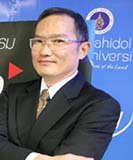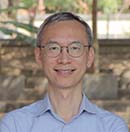This is another approach to reduce background colonies, or false positive clones that may be arisen from intact or self-ligated plasmid in molecular cloning. Two
Author: Webmaster
Three novel mutations in α-galactosidase gene involving in galactomannan degradation in endosperm of curd coconut
This is the first report to identify gene in coconut responsible for curd phenotype. The gene is endosperm specific α-galactosidase. DNA encoding α-galactosidase gene alleles
Development and Validation of an Enzymatic Method to Determine Stevioside Content from Stevia rebaudiana
We established enzymatic method for specific determination of stevioside content. The key enzyme came from recombinant β-glucosidase BT_3567 (rBT_3567) from Bacteroides thetaiotaomicron HB-13 which exhibited
BC Special Seminar: October 11, 2023
BC Special Seminar Department of Biology and Department of Biochemistry by Prof. Qiu-Xing Jiang, Ph.D. Time: 01:00-03:00 pm (Bangkok) Venue: R401
BC Special Seminar: September 6, 2023
BC Special Seminar “Transforming a Life Science to Startup” by Mr. Komkrit Sajja-anantakul Director and Co-Founder BIOadventure. Co. Ltd. Time: 01:00-03:00 pm Venue: B301
BC Special Seminar: August 23, 2023
BC Special Seminar “Polymeric and Inorganic nanocarriers for healthcare applications” by Professor Anna Roig Institute of Materials Science of Barcelona (ICMAB-CSIC), Spain Time: 11.00 am
BC Faculty Seminar: August 9, 2023
BC Faculty Seminar “Dehydrogenases: Mechanism insight and its versatile applications” by Assoc. Prof. Ruchanok Tinikul Department of Biochemistry, Faculty of Science, Mahidol University Date: Wednesday,
BC Special Seminar: July 18, 2023
BC Special Seminar “Targeting the Epigenetic Machinery to Enhance Cancer Immunotherapy” by Professor Michael Chan Director, Epigenomics and Human Diseases Research Center (Epi-HDR) Deputy-Director, Center
BC Special Seminar: July 12, 2023
BC Special Seminar “Hyperglycemia as an emerging linkage between diabetes mellitus and cancer: a molecular approach” by Asst. Prof. Charupong Saengboonmee, M.D., Ph.D. Department of
BC Special Seminar: July 5, 2023
BC Special Seminar “Development of polymer gel-tethered bilayer (PGTB) as modern cell membrane mimetics and platform for biological study” by Kridnut Chuduang Ph.D. Candidate, Indiana








